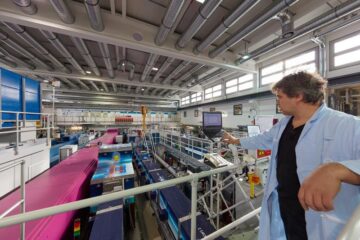Use Of Over-The-Counter At-Home Defibrillators Strongly Supported By Leading Cardiologist

An estimated 70-80 percent of cardiac arrests occur at home, often suddenly and without warning. With the FDA’s recent approval of over-the-counter at-home automated external defibrillators (AEDs), individuals and families now have another weapon available to them. Defibrillators are the only means of re-starting the heart with a jolt of electricity after a cardiac arrest. While cardio-pulmonary resuscitation (CPR) can help buy time, experts estimate that every minute spent waiting for paramedics to arrive with a defibrillator reduces the chances of survival by about 10 percent.
P. K. Shah, M.D., Director of the Division of Cardiology and the Atherosclerosis Research Center at Cedars-Sinai Medical Center in Los Angeles, believes that having the at-home defibrillators immediately available in the event of a heart attack is a good idea. The key, he believes, will be in making sure that everyone in the household be fully trained to provide CPR and to use the defibrillators.
“This is a long overdue step which I strongly support,” says Dr. Shah. “Because 70 to 80 percent of all cardiac arrests occur in the home environment, there is a need for these devices to be available in people’s homes, so lives can be saved.” “If cardiac arrest occurs, the first thing to do is call 9-1-1,” says Dr. Shah. “Get help on the way, then begin CPR and if you have an AED and have been properly trained, use it.”
Each year, about 220,000 American die of cardiac arrest, which strikes immediately and often without warning. It has been well documented that the earlier a patient received medical attention, the better his or her chances of survival will be.
A Magnet Nursing accredited facility, Cedars-Sinai Medical Center is one of the largest nonprofit academic medical centers in the Western United States. For the fifth straight two-year period, it has been named Southern California’s gold standard in health care in an independent survey. Cedars-Sinai is internationally renowned for its diagnostic and treatment capabilities and its broad spectrum of programs and services, as well as breakthroughs in biomedical research and superlative medical education. It ranks among the top 10 non-university hospitals in the nation for its research activities and was recently fully accredited by the Association for the Accreditation of Human Research Protection Programs, Inc. (AAHRPP).
Media Contact
Weitere Informationen:
http://www.csmc.eduAlle Nachrichten aus der Kategorie: Medizin Gesundheit
Dieser Fachbereich fasst die Vielzahl der medizinischen Fachrichtungen aus dem Bereich der Humanmedizin zusammen.
Unter anderem finden Sie hier Berichte aus den Teilbereichen: Anästhesiologie, Anatomie, Chirurgie, Humangenetik, Hygiene und Umweltmedizin, Innere Medizin, Neurologie, Pharmakologie, Physiologie, Urologie oder Zahnmedizin.
Neueste Beiträge

Bakterien für klimaneutrale Chemikalien der Zukunft
Forschende an der ETH Zürich haben Bakterien im Labor so herangezüchtet, dass sie Methanol effizient verwerten können. Jetzt lässt sich der Stoffwechsel dieser Bakterien anzapfen, um wertvolle Produkte herzustellen, die…

Batterien: Heute die Materialien von morgen modellieren
Welche Faktoren bestimmen, wie schnell sich eine Batterie laden lässt? Dieser und weiteren Fragen gehen Forschende am Karlsruher Institut für Technologie (KIT) mit computergestützten Simulationen nach. Mikrostrukturmodelle tragen dazu bei,…

Porosität von Sedimentgestein mit Neutronen untersucht
Forschung am FRM II zu geologischen Lagerstätten. Dauerhafte unterirdische Lagerung von CO2 Poren so klein wie Bakterien Porenmessung mit Neutronen auf den Nanometer genau Ob Sedimentgesteine fossile Kohlenwasserstoffe speichern können…





















